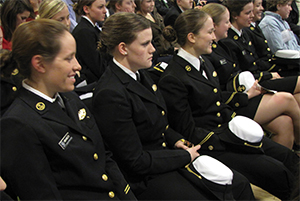The federal Maritime Administration in June suspended the Sea Year program at the U.S. Merchant Marine Academy (USMMA), throwing the curriculum for midshipmen into confusion and raising the ire of alumni.
MarAd said it was halting the program, in which midshipmen spend the equivalent of an academic year aboard commercial and government vessels, until it could ensure an environment free of sexual harassment or worse.
In response, a group of commercial shipowners whose vessels have participated in Sea Year formulated a proposal for improving shipboard culture. The plan is being reviewed by a team of MarAd and academy representatives. The school has not provided a timeline for completing the review, but emphasized on its website in July that Sea Year “will remain a core element of the academy’s academic program.”
While the Kings Point, N.Y., academy said in a June 16 news release that it and MarAd “have made consistent efforts to address sexual assault and sexual harassment on campus over the last few years, we’ve grappled with appropriate means of extending these efforts during Sea Year … The safety of these young women and men are our highest priority, and the USMMA is standing down having midshipmen serve on these vessels until it is assured that their training will be carried out in a safe environment.
“We are making every effort to ensure an on-time graduation for any affected students,” the USMMA statement said.
MarAd spokeswoman Kim Strong said the agency was not responding to any specific incidents aboard merchant vessels but was taking prudent precautions.
The suspension was called an overreaction by the school’s alumni group. Jim Tobin, president of the USMMA Alumni Association and Foundation, said the organization asked members to contact their representatives in Congress to get the Sea Year program reinstated immediately.
“I think there is an issue,” Tobin said, “(but) we feel that they could have still sent the midshipmen out to sea while working on this.”
Tobin added, “We’ve seen no statistics so we don’t know the extent. I know that the shipping companies that have policies in place are going to make sure that it’s even better. Prosecuting the bad actors is really the key. Why suspend it and put these midshipmen’s careers in jeopardy?”
After suspending the program, MarAd and the academy convened more than 90 industry representatives in Washington on June 24 to hear suggestions for addressing the issue. The discussions focused on industry culture, sexual assault and sexual harassment awareness and prevention efforts, training programs for reporting protocols, assignment of onboard mentors, debriefing of midshipmen upon completion of their Sea Year training, vessel visits by company representatives and a 24/7 hot line.
On July 8, the academy announced that it would partially lift the suspension and allow students assigned to federal government vessels, primarily involved in the Military Sealift Command, to sail again.
Strong said in mid-July that of the 216 midshipmen affected by the suspension, seven were on MSC vessels and would remain on board, 40 were on sailing academy training vessels and 73 others would be assigned to MSC ships in the next few weeks. There were 14 still at sea who had not arrived at an appropriate port to disembark.
The suspension and review of the Sea Year program occurred just before the Middle States Commission on Higher Education issued a report on the academy’s reaccreditation. It raised concerns about combating sexual harassment and assault as well as the governance of the academy. These issues could threaten reaccreditation.
Kings Point responded in a statement that it had two years to reach compliance and it was confident it could do so.
The accreditation team also cited “noteworthy achievements” in areas including Sea Year and admissions. Kings Point noted that its most recent incoming classes have been the most diverse in its history and also the most qualified.

